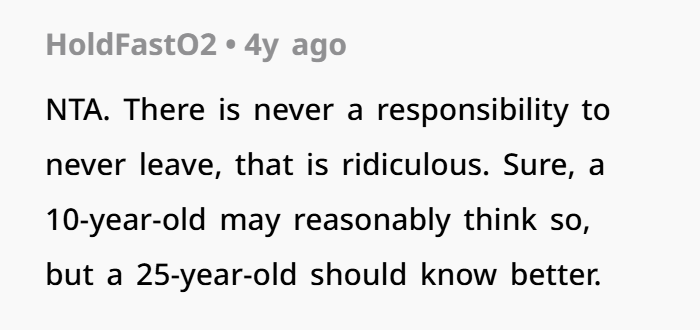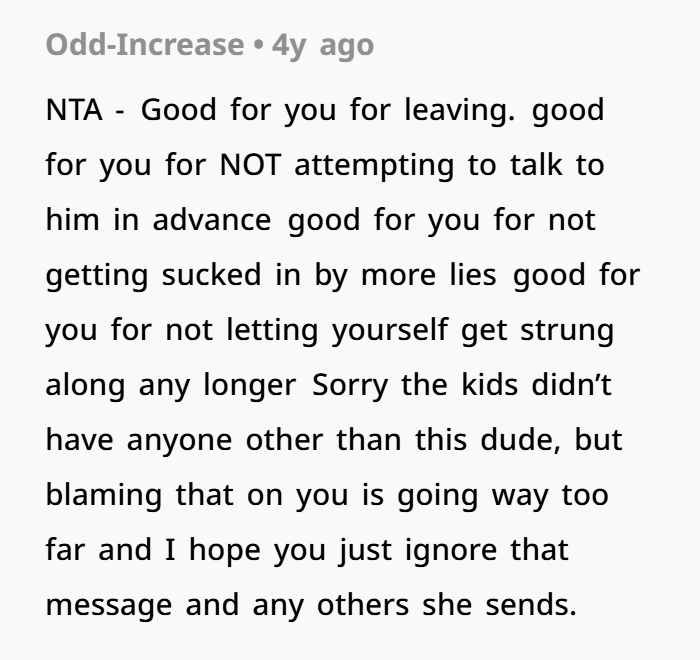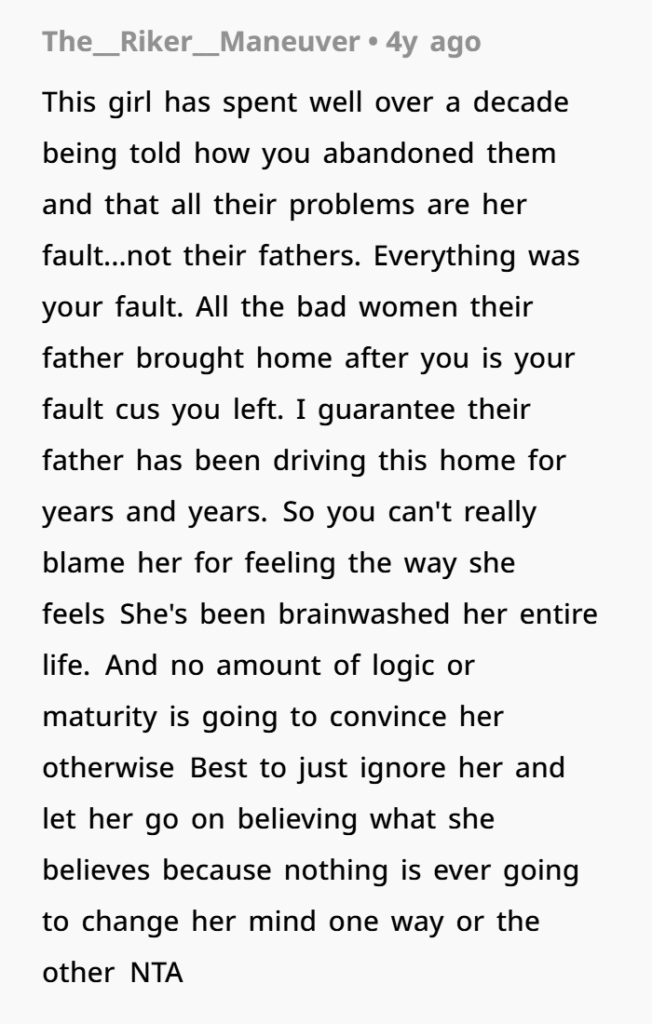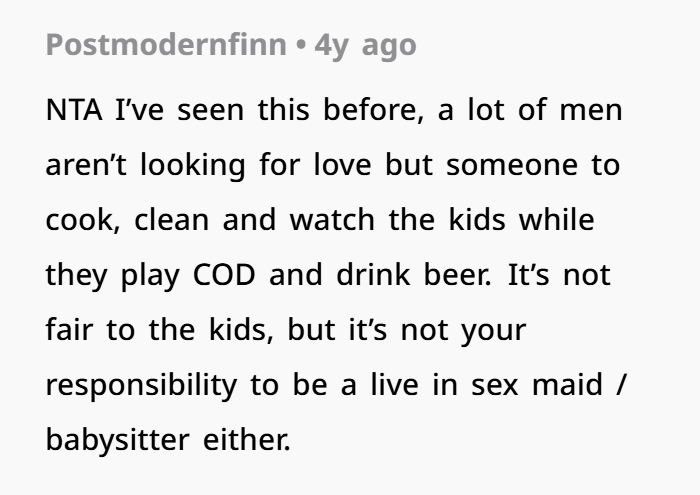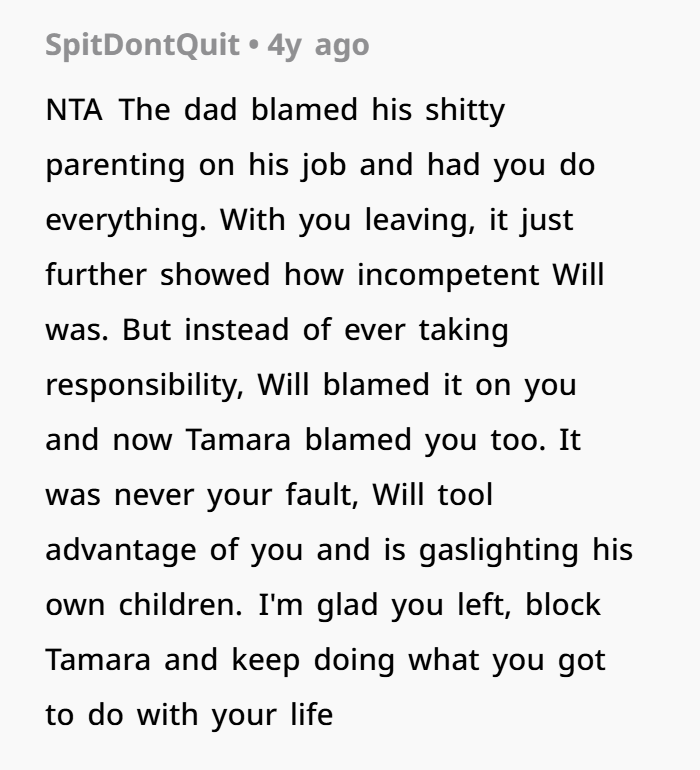AITA for Breaking My Promise to My Stepkids and “Abandoning” Them?
You married a man with two young children, and early on made promises to them—part of the “package deal” your husband envisioned. You weren’t a stay‑home parent, yet you ended up bearing nearly all the emotional and logistical labor of caring for them. Over time, resentment built. You admit you never felt love toward them (beyond duty), and you eventually walked out, leaving a note and disappearing from their lives entirely. Fifteen years later, one of them reaches out accusing you of betrayal, abandonment, and lifelong trauma.
You’re asking: AITA for breaking a promise and quitting a role you never wanted?
On balance, I lean No, you’re not (or at least not fully) — but the picture is messy, and “not being the a‑hole” doesn’t mean your choice came without consequences, emotional cost, or responsibility (moral or psychological). Let me walk you through how I see the tension, and what the mid‑view looks like.
Bonds between stepparents and stepchildren can be unique and meaningful, though they often come with their own challenges

A woman shared that her former stepchild confronted her, accusing her of abandoning them 15 years ago
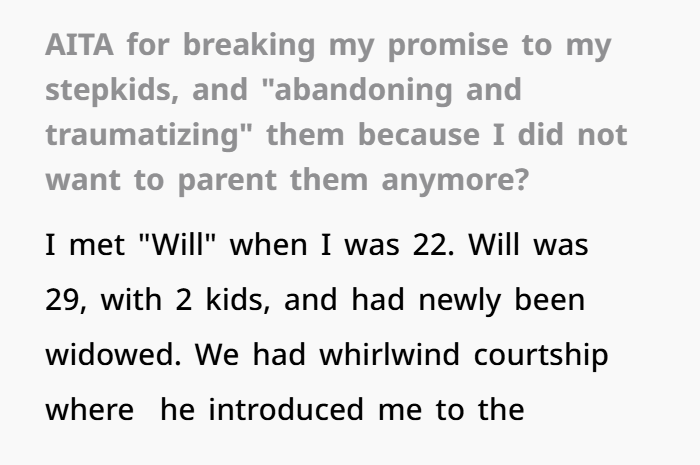
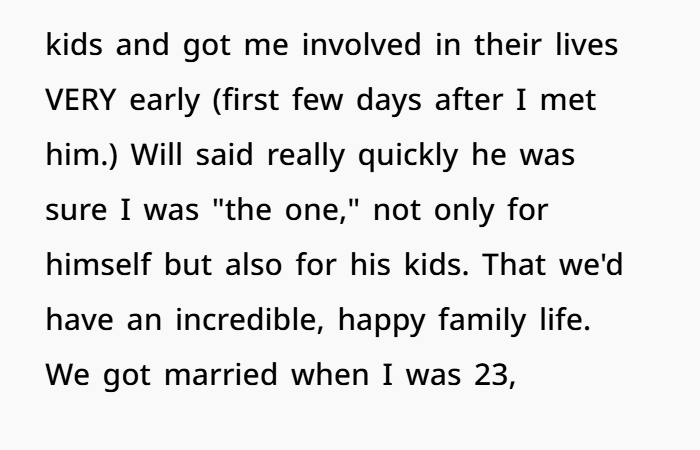
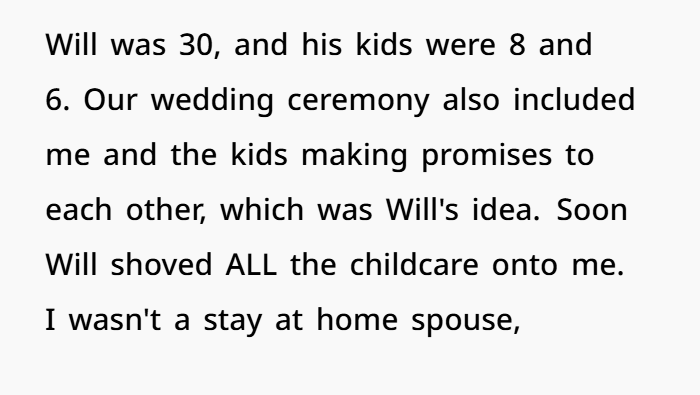
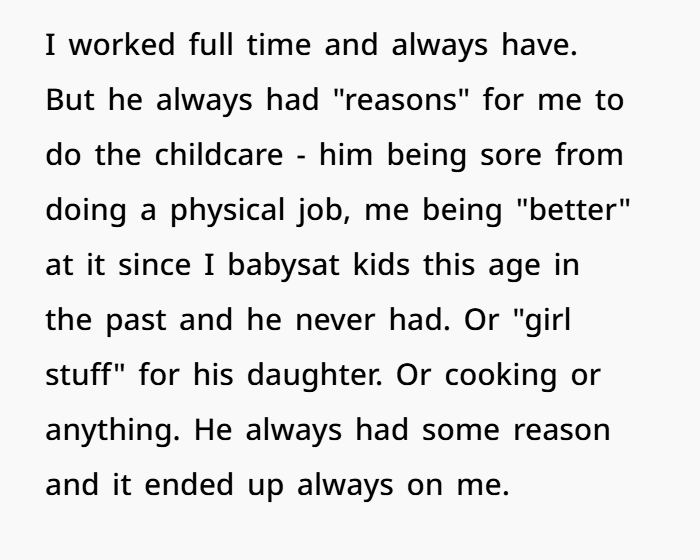
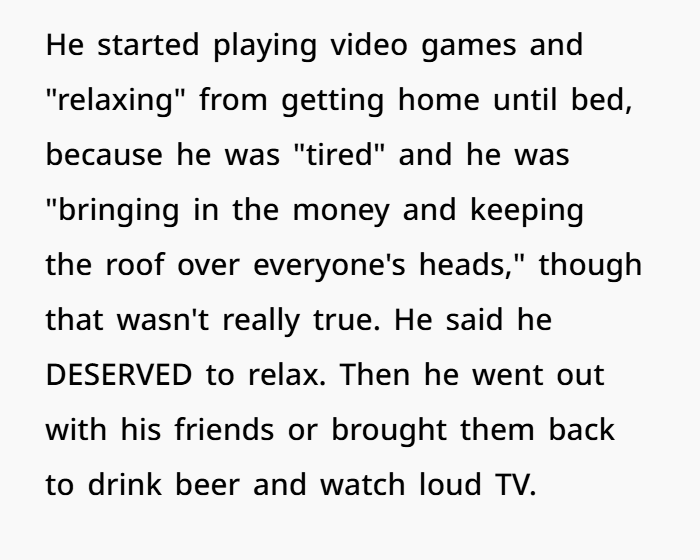
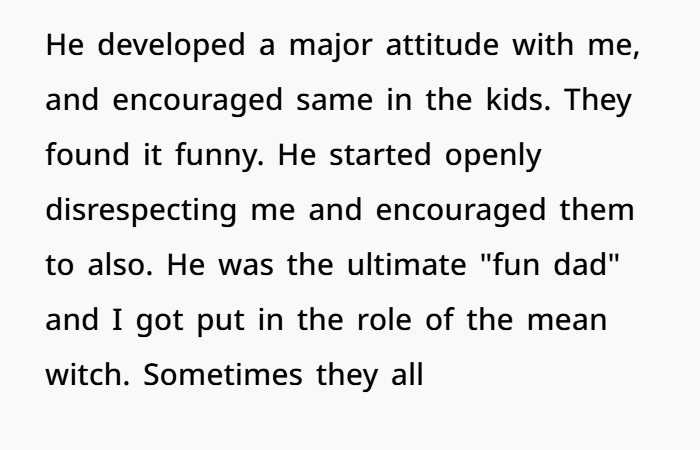
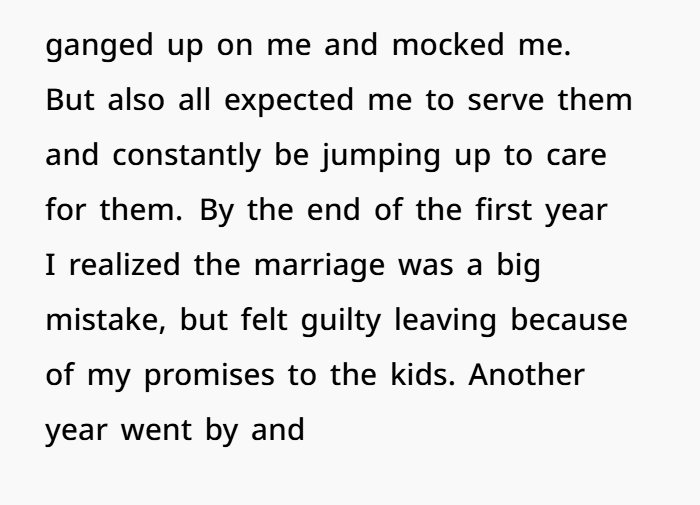
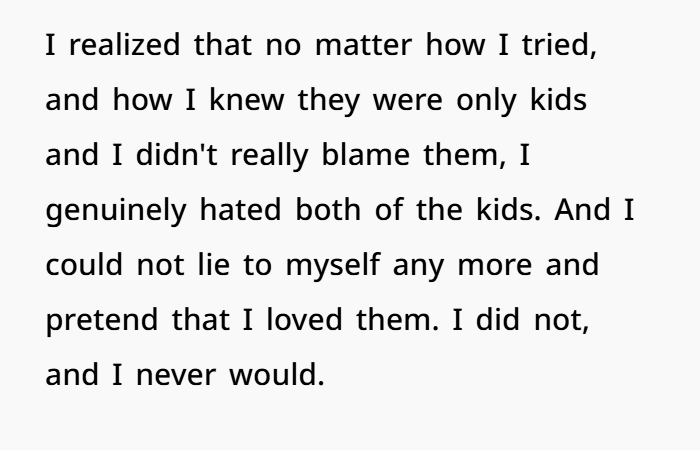

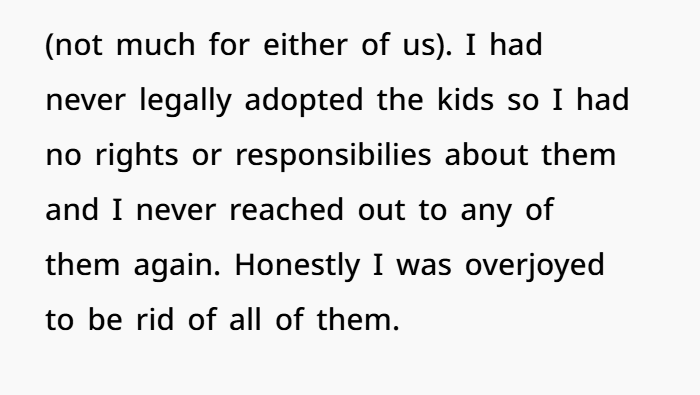
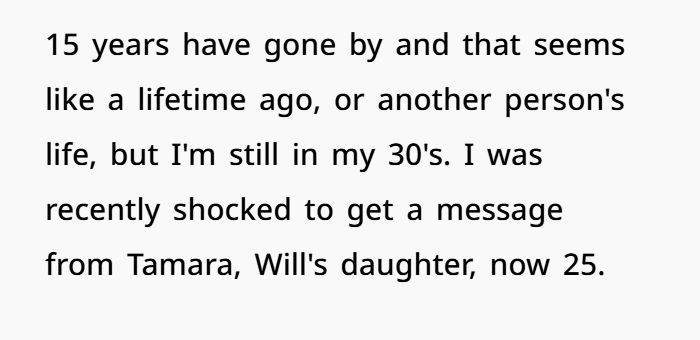
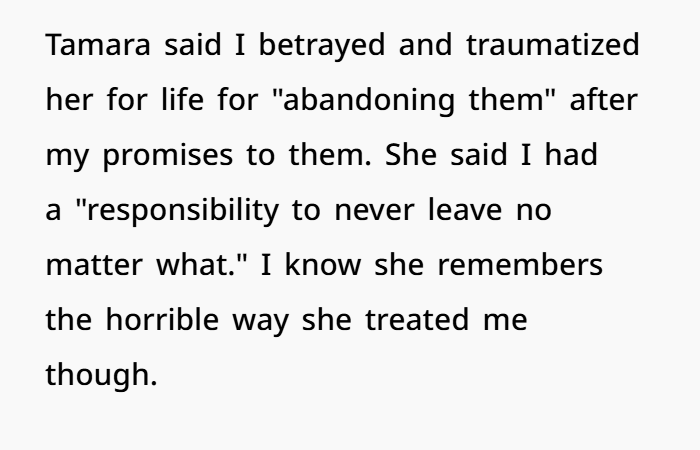
1. The Nature of Promises in Stepfamilies
When you entered the marriage, making promises to the kids likely felt like a gesture of goodwill and commitment. But promises made under pressure or early in a relationship—especially when one is still figuring out the dynamic—carry risk. Many stepfamilies struggle because roles and expectations aren’t clearly established.
Psychologists note that entering into a stepparent role involves navigating emotional, legal, and relational ambiguity. You may behave as a parent in many ways, but without the legal or social infrastructure to support it, the burden falls unevenly.
Because your marriage quickly handed you full responsibility—for child care, emotional labor, discipline, household tasks—those promises became practically binding before you even had a chance to choose your capacity. You were set up to fail.
2. Emotional Labor, Burnout, and Resentment
Your story shows classic signs of emotional burnout. You were working full time, expected to do all the parenting, cleaning, organizing, mediating, disciplining. Your husband, meanwhile, claimed the right to relax because he “deserved it.” You became the default caregiver, the emotional and organizational backbone of the home.
Over time, resentment and fatigue build when someone feels unseen, undervalued, or treated unfairly. In stepfamilies, that burden is magnified — because step‑relationships naturally lack the deep genetic/biological bond, stepparents can more easily feel “outsider” and less supported in their role. Some evolutionary psychology theories (like the “Cinderella effect”) suggest that stepparents are at a higher risk of relational conflict or neglect simply due to weaker inherent bonding triggers. Wikipedia

When the environment is persistently disrespectful (kids mocking you, your spouse condoning it), even a deeply hopeful or patient person can reach breaking point.
3. Love, Duty, and Authenticity
One of the most painful parts of your narrative is your admission: you never felt love for the kids. You tried to pretend, but couldn’t. Many people enter step-parenting with the hope that love will come with time; for some, it does, for others, it doesn’t. Pretending to feel something you don’t can be self‑destructive, and it can also foster deeper harm—resentment, frustration, emotional withdrawal.
A moral question arises: is it better to stay in a role you can’t fulfill, or leave honestly? Neither is easy, neither is morally spotless. Staying might preserve stability for the kids, but at the cost of your mental health and authenticity. Leaving might relieve you, but it also wounds others.
4. Abandonment Trauma & Long-Term Effects on Children
For the children, especially if they viewed you as a parent or adult figure, your departure likely felt like abandonment—even if legally you had no binding duty. Abandonment triggers deep insecurities, fears, internalized self‑blame, chronic doubts about being worthy of love or stability. PMC+3aplaceofhope.com+3cptsdfoundation.org+3
Research into abandonment, attachment, and relational trauma shows that sudden or complete leaving is more damaging than gradual withdrawal. Children left without explanation or continuity may internalize rejection, shame, and a core fear that relationships are unreliable. University of Minnesota Extension+1
Their perspective is valid: to them, your promise was part of their world. To break it is betrayal. Even if they were disrespectful or abusive toward you, their pain doesn’t vanish.

5. Responsibility Without Legal Obligation
Legally speaking, a stepparent who never adopted a child often has no financial or custodial duty toward them. Many jurisdictions explicitly state that unless you adopt or formally assume guardianship, you aren’t legally obligated to “maintain” them. Wirth Law Office – Oklahoma City+2custodyxchange.com+2
But moral, psychological, and relational responsibility is more fluid. You entered the role socially, emotionally, and practically. Others may expect you to continue even without legal obligation. From a moral lens, one could argue that any adult who steps into a dependent role bears some residual responsibilities, especially if promises were made.
6. The Healing (If It’s Possible)
If you want to reconcile or at least engage with the daughter’s accusations, here are paths (not guarantees):
- Acknowledge the hurt: Even if you felt justified, acknowledging her pain doesn’t undo your boundaries, but it opens a space for dialogue.
- Explain, don’t excuse: Why you left, what you felt, what you tried, etc. Transparency can help.
- Set boundaries: You don’t owe full parental role, but you can offer limited contact or support, if safe and healthy.
- Encourage therapy: Abandonment trauma is deep; professional help might help her process her feelings. Psychology Today+1
- Accept that reconciliation may not happen: You can show willingness, but you can’t force trust or healing.
My Take & Judgment
So, AITA? I’d say NTA, with caveats. You were put into a role you did not sign up for, burdened unfairly, and forced to carry emotional labor that your spouse should have shared. You had the right to your boundaries, authenticity, and mental health. Walking away, painful though it was, was a way to preserve your own sanity.
But that doesn’t mean you were blameless.
- You made promises, which carried weight in their lives. Those promises left a wound when broken.
- You chose silence and escape over confrontation, negotiation, or gradual transition.
- You left without attempting counseling, setting clearer expectations, or giving them the chance to adapt.
So your choice was understandable; your approach is debatable.
You’re not a total villain, but you also didn’t own the damage. Life is messy. People you cared for (even imperfectly) were hurt. You’ve done something regrettable, not necessarily wrong in the broad sense—but living with the aftermath means owning pieces of it.
If I were to assign a verdict: NTA (with remorse).
If you want, I can help you draft a letter to your daughter or think through whether, and how, you should respond. Do you want me to help with that?
Many people felt the woman acted appropriately and argued that she had no obligation toward her ex-husband’s children
